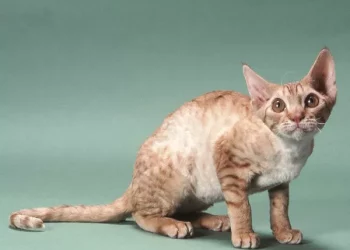Calico cats, with their striking coats featuring patches of orange, black, and white, have long captivated our attention. They are known for their unique beauty and intriguing genetic makeup. However, an unfortunate and persistent misconception persists that calico cats are inherently mean or have challenging personalities. In this article, we will delve into the fascinating world of calico cats, exploring their genetics, individual temperament, and dispelling the myth that they are mean-spirited creatures.
The Genetics Behind Calico Cats:
Calico cats owe their distinctive coat patterns to a genetic phenomenon called “co-dominance.” Female calico cats possess two X chromosomes, while males have one X and one Y chromosome. The coat color gene, located on the X chromosome, determines the color patches seen in calico cats. As a result of X chromosome inactivation, different areas of the cat‘s body express either the orange or black color, giving rise to the calico pattern.
Understanding Cat Personality:
Cat personality is influenced by a combination of genetic factors, early socialization, and individual experiences. Each cat, regardless of its coat color or pattern, possesses a unique temperament that can vary widely. Factors such as breed, upbringing, socialization, and owner interaction all play significant roles in shaping a cat’s behavior and demeanor.
Dispelling the Myth:
Individual Personality Traits:
Like humans, cats have distinct personalities. It is unfair to generalize the temperament of an entire group of cats based solely on their coat color. Calico cats, just like any other feline, can exhibit a wide range of temperaments, including being affectionate, playful, independent, or even reserved. It is important to recognize that a cat’s personality is shaped by a combination of genetic predispositions and individual experiences.
Socialization and Environment:
A cat’s behavior and disposition are heavily influenced by its early socialization and environmental factors. Calico cats that receive proper socialization, love, and care from an early age are more likely to develop friendly and affectionate personalities. Similarly, a stressful or neglectful environment can impact a cat’s behavior negatively, regardless of its coat color.
Individual Experiences:
The behavior of any cat, including calico cats, can be influenced by their individual experiences throughout their lives. Traumatic experiences, neglect, or inadequate training can result in behavioral issues, such as aggression or fearfulness. It is essential to provide a loving, nurturing environment and engage in positive reinforcement training to foster a well-rounded and contented cat.
Communication and Understanding:
Cats communicate through body language, vocalizations, and behavior. Misinterpreting these signals may lead to misunderstandings or labeling a cat as “mean” when they are simply expressing their needs or boundaries. Learning to interpret cat behavior and respond appropriately can contribute to a harmonious and positive relationship with any feline companion, including calico cats.
Conclusion:
The belief that calico cats are mean-spirited creatures is an unfounded myth that fails to consider the complexity and individuality of feline personalities. Like all cats, calico cats exhibit a wide range of temperaments and behaviors that are influenced by a multitude of factors. It is crucial to approach each cat as an individual, providing love, care, and proper socialization to foster a positive bond.
By dispelling the myth and embracing the uniqueness of calico cats, we can appreciate their stunning coat patterns and celebrate the diversity of feline personalities. Whether a calico, tabby, or solid-colored cat, each feline companion deserves our understanding, patience, and love. Let us cherish the enchanting calico cats for their beauty and individuality, setting aside misconceptions and embracing the joy of sharing our lives with these captivating creatures.

























